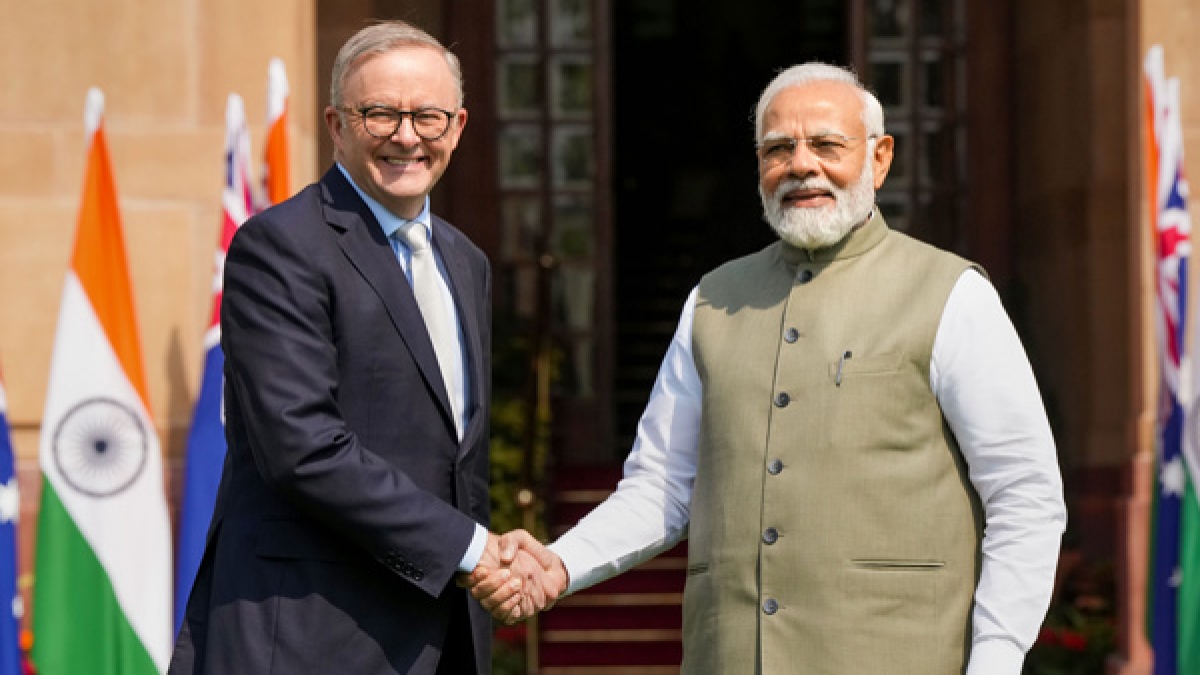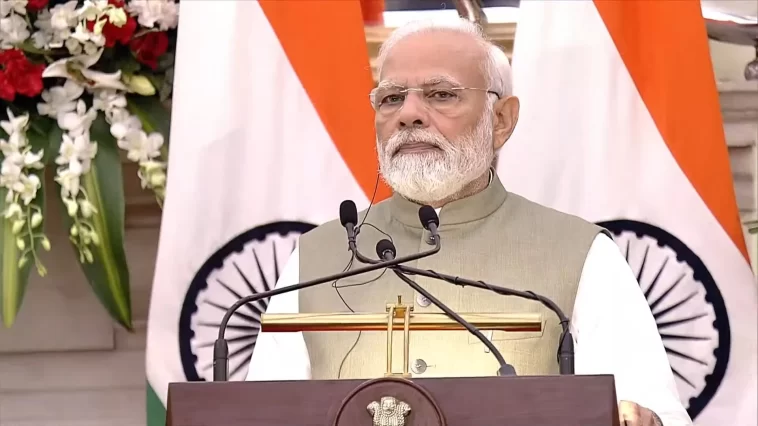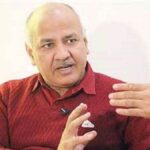Friday in New Delhi, Prime Minister Narendra Modi shakes hands with his Australian counterpart Anthony Albanese following an exchange of agreements and a press statement.

India and Australia signalled their intent to increase cooperation in defence, trade, and professional mobility on Friday in NEW DELHI, as Prime Minister Narendra Modi raised concerns about recent assaults on temples with his Australian counterpart Anthony Albanese.
After participating in the first annual India-Australia Summit, Modi and Albanese announced that the two countries were advancing with a comprehensive economic cooperation agreement (CECA) to upgrade an interim trade deal concluded last year and a migration and mobility pact that will benefit students and professionals.
ALSO READ : Australia’s Prime Minister refers to India as a “Top Security Partner.”
During a joint media interaction following their discussions, Modi described security cooperation as a crucial pillar of the bilateral comprehensive strategic partnership and stated that the two sides discussed maritime security cooperation in the Indo-Pacific region and ways to enhance bilateral security and defence cooperation.
Albanese stated that both parties are committed to strengthening the defence and security partnership in order to resolve shared challenges and advance an open, stable, and prosperous Indo-Pacific. Modi stated that he conveyed India’s concern regarding recent assaults on Australian temples.
In recent weeks, the Indian side has repeatedly raised this issue with the Australian government in response to incidents involving pro-Khalistan groups.
“It is concerning that there have been frequent reports of attacks on temples in Australia over the past few weeks. It is only natural that such news would cause great concern and distress in India,” Modi said in Hindi.
“I communicated our views and concerns to Prime Minister Albanese. He has assured me that the Indian community’s safety is a top priority for him. Our teams will remain in regular contact and cooperate as necessary regarding this matter, he added.
Albanese, who will return to India in September for the G20 Summit, has also extended an invitation to Modi to attend the Quad Leaders Summit in Australia in May.
Three agreements on cooperation in athletics, audio-visual co-production, and the mandate for an India-Australia solar task force were also signed. In addition, they signed a letter of intent for cooperation between the Atal Innovation Mission of India and the Commonwealth Scientific and Industrial Research Organisation of Australia.
Albanese arrived in Ahmedabad on March 8 for a three-day visit. Besides participating in Holi celebrations on Wednesday, he joined Modi to witness the first day of the final Test match of the Border-Gavaskar Trophy on Thursday.
In Mumbai, Albanese and the high-powered business delegation that accompanied him met with prominent Indian Executives. He also visited the aircraft carrier INS Vikrant in the waters off Bombay and announced that Australia will host the annual Malabar naval exercise between the navies of India, Japan, and the United States this year.
During the joint media interaction, Modi remarked that the two countries had signed a number of significant defense-related agreements in recent years, including one on the exchange of logistical support between their armed forces. According to him, both parties also discussed methods to enhance the regular exchange of intelligence between security agencies.
Modi stated that the Economic Cooperation and Trade Agreement (ECTA) signed last year has improved trade and investment opportunities for both countries. He added, “Our experts are working on CECA.”
Albanese stated that the ECTA eliminated tariffs on more than 85 percent of Australian exports to India, thereby benefiting consumers and providing affordable inputs to industry, and he is optimistic that the CECA will be finalised this year.
“We also agreed to conclude our ambitious CECA as quickly as possible, and I am optimistic that we will be able to do so this year. This transformative agreement will realise the full potential of the bilateral economic relationship, creating new employment opportunities and raising the standard of living for the people of both Australia and India, according to Albanese.
The two parties have also finalised a mechanism for mutual recognition of educational credentials, which will benefit students. “Progress is being made on a mobility agreement. This will benefit pupils, workers, and professionals, as stated by Modi.
Albanese applauds the new agreement to facilitate the mutual recognition of educational credentials and has expressed a desire to expand the presence of Australian universities in India.
“I am also delighted to announce that significant progress has been made on a new migration and mobility partnership arrangement. This arrangement will promote and support the mobility of students, graduates, academic researchers, businesspeople, and other professionals from emerging and high-tech sectors, both now and in the future, while also enhancing cooperation on irregular migration issues, he explained.
The next time we meet in Australia, we hope to have more to say about this new initiative, he said.
Cooperation in green and renewable energy, particularly solar and green hydrogen, and collaboration within the Quad were also discussed.




